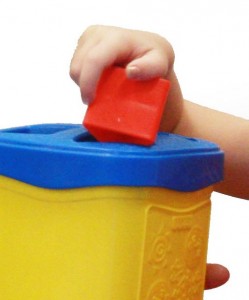
Children who struggle with various aspects of their learning and development are sometimes described as having “global developmental delay”. What does this mean?
The term “global developmental delay” is used to describe a child who is behind other children of the same age in most or all areas of development. “Global” means that the child’s difficulties are across most areas of their development, including fine and gross motor skills, speech and language, social skills, learning and activities of daily living. “Developmental”means the delay begins in early childhood and affects the child’s progress though the expected stages. “Delay” means that the child develops skills at a later time than other children of the same age.
Delays with gross motor skills can include:
- Being later to develop the skills of rolling, sitting and crawling as a baby
- Being later to begin to walk
- Lacking co-ordination with skills such as running, jumping and climbing
Delays with fine motor skills can include:
- Being later to develop skills for craft type activities such as drawing and cutting
- Being later to develop hand skills such as building with blocks and doing puzzles
- Being later to develop pencil skills such as handwriting
Delays with speech and language skills can include:
- Being later to begin to use words to communicate
- Being later to combine words into sentences
- Having more difficulty following instructions than others of the same age
- Taking longer to learn new words and concepts
- Taking longer to develop literacy skills
- Using speech sounds, sentences and conversation which sound like a younger child
Delays with learning can include:
- Taking longer to learn to understand concepts such as colours and counting
- Being later to develop play skills such as pretending
- Taking longer to learn and remember new information
- Taking longer to learn reading, writing, spelling and maths skills
Delays with social skills can include:
- Being later to develop co-operative play with other children
- Having difficulty maintaining friendships with children of the same age
- Prefering to play with younger children
- Taking longer to learn to share, take turns, negotiate and problem solve
Delays with activities of daily living can include:
- Being later to learn to put on clothes, do up buttons, zips and laces
- Being later to learn to use a spoon, knife, fork and cup
- Being later to learn to brush hair and teeth independantly
- Being later to develop toilet training
As all children are different, children suspected of having a global developmental delay require individual assessment and a carefully planned program to develop their skills.
Common questions
If I think my child has global developmental delay what do I do? Child and youth health services are a good place to start. They can assess your child’s skills in relation to what is expected for their age and advise you what to do next. A paediatrician or psychologist can provide a more detailed assessment of your child’s overall development. A paediatrician can also check for any medical issues that may be affecting your child’s development. A specialised assessment with a speech pathologist for speech and language skills or an occupational therapist for fine motor and daily living skills is also important. Your child should also have a hearing and vision assessment. Following assessment, therapy services can be provided to help your child develop the skills they need.
What kind of support does my child need? Support needs vary from child to child so each child should be individually assessed to determine what is most important for them. Many children benefit from speech pathology for communication skills and occupational therapy for fine motor and sensory issues. Providing a stimulating environment at home is also important as well as opportunities to interact with other children in a stimulating environment such as playgroup or kindergym. Your child may also benefit from support at preschool and school and this is best discussed with staff before your child begins if possible.
What causes global developmental delay? Global developmental delay can be related to genetic disorders and it is more common in children who were premature or from a multiple birth, however often the cause is not known. An assessment from a paeditarician is recommended to check for any possible medical causes.
For more information about speech and language development and delays, assessment, therapy and ideas for helping your child check the Talking Matters Website.
Related posts:
The importance of play
Top 10 speech ideas
Top 10 language ideas
How stories help your child
What is autism?
Related Blog Posts
If you liked this post you may also like:
Two year olds
Touch
Why do services cost what they do?
Christmas sparkle



